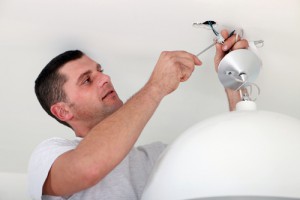 In response to all the questions put to the DIY Advice team about home and garden DIY, weÔÇÖve decided to launch a new ÔÇÿHow toÔǪÔÇÖ series. And what more of an ÔÇÿilluminatingÔÇÖ way to start than with a step-by-step guide to one of the most useful DIY skills you can have ÔÇô fitting a new light fixture to the ceiling!
In response to all the questions put to the DIY Advice team about home and garden DIY, weÔÇÖve decided to launch a new ÔÇÿHow toÔǪÔÇÖ series. And what more of an ÔÇÿilluminatingÔÇÖ way to start than with a step-by-step guide to one of the most useful DIY skills you can have ÔÇô fitting a new light fixture to the ceiling!
- The first step is to switch off the power supply at the mains – simply switching off the light you are going to change at its switch is not enough and could cause you serious harm. If the light was previously on, wait for the bulb to cool down
- Remove the old shade via the screws or clips. Unscrew the light bulbs to prevent them from smashing and then remove the fixture base via the bolts
- Using a non-contact voltage tester, double check that the circuit is off. ItÔÇÖs now safe to loosen and disconnect the wiring before removing the old fixture completely. Be prepared for some dust to fall on you!
- If the new light is of a fairly similar design (and age) to the old one, it might be possible to use the original mounting bracket. If they are different, remove the old one and attach the bracket that comes with your replacement light
- Wire the new fitting. Connect the brown (or if itÔÇÖs older, red) cable to the live terminal connection. Connect the blue (or if itÔÇÖs older, black) cable to the neutral terminal connection. Connect the green and yellow earth cable to the earth terminal, covering any exposed copper with earth cable sleeving.┬áNB. You might need somebody to hold the light fitting for you to take its weight whilst┬áyou connect the wiring
- Carefully push the wires into the ceiling box and, following the manufacturerÔÇÖs instructions, secure the light fixture base to the mounting bracket, making sure no wires are caught between the fitting and the ceiling
- Install the light bulbs and screw on the new light shade
- Turn the mains electricity back on, flip the light switch and stand back to admire your handiwork!
Installing a new ceiling light is not a difficult job or one that requires a great deal of DIY experience. The golden rule with DIY, however, is that if youÔÇÖre really uncomfortable attempting a task ÔÇô donÔÇÖt. Calling in an electrician might seem like an unnecessary expense but itÔÇÖs far better to pay up than risk injuring yourself or other people in your home.